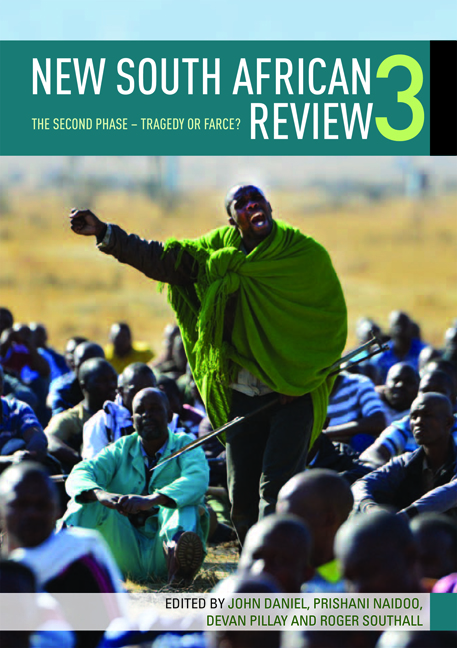Book contents
- Frontmatter
- Contents
- Preface
- Introduction: The second phase – tragedy or farce?
- PART 1 Party, Power and Class
- Introduction: Party, power and class
- Chapter 1 The power elite in democratic South Africa: Race and class in a fractured society
- Chapter 2 The ANC circa 2012-13: Colossus in decline?
- Chapter 3 Fragile multi-class alliances compared: Some unlikely parallels between the National Party and the African National Congress
- Chapter 4 Predicaments of post-apartheid social movement politics: The Anti-Privatisation Forum in Johannesburg
- PART 2 Ecology, Economy and Labour
- PART THREE Public Policy and Social Practice
- PART 4 South Africa at Large
- Contributors
- Index
Chapter 2 - The ANC circa 2012-13: Colossus in decline?
from PART 1 - Party, Power and Class
Published online by Cambridge University Press: 31 May 2019
- Frontmatter
- Contents
- Preface
- Introduction: The second phase – tragedy or farce?
- PART 1 Party, Power and Class
- Introduction: Party, power and class
- Chapter 1 The power elite in democratic South Africa: Race and class in a fractured society
- Chapter 2 The ANC circa 2012-13: Colossus in decline?
- Chapter 3 Fragile multi-class alliances compared: Some unlikely parallels between the National Party and the African National Congress
- Chapter 4 Predicaments of post-apartheid social movement politics: The Anti-Privatisation Forum in Johannesburg
- PART 2 Ecology, Economy and Labour
- PART THREE Public Policy and Social Practice
- PART 4 South Africa at Large
- Contributors
- Index
Summary
INTRODUCTION
Nineteen years into formal state power, the African National Congress (ANC) – by 2012-13 and in the presidency of Jacob Zuma – had reached the point where its political power remained formidable but, by all available indicators, beyond its peak. In the wake of the Mangaung elective conference, ANC leadership structures were taking stock of where the leadership battle had been taking the movement. There were two strands in this assessment process. The Zumaists publicly proclaimed that the ANC was stronger than ever, united, and at the pinnacle of its achievements. By contrast, others in the ANC expressed concern about Zuma's leadership, the quality of governance and, in particular, organisational weaknesses that had compounded deficits in government.
This raises questions as to how the ANC has been going about building and regenerating its power since political liberation. The process of shedding – being ‘beyond peak’ – has been far from fatal; the ANC retains a huge buffer of power, inclusive of popular and electoral support, over all party political rivals. Yet, the apparent turn to shedding power, rather than further accumulating and consolidating it, poses the challenge of identifying and dissecting the processes or mechanisms through which, and the manner in which, the ANC has been regenerating (even if imperfectly) its power. The unpacking of ANC power through these ‘mechanisms’ also helps concretise assessments of ANC strengths and weaknesses, of the state of ANC power, circa 2012 going into 2013.
This chapter has two objectives: conceptually, to identify and expound on such mechanisms; and analytically, to assess the state of ANC power regeneration in 2012-13 through the seven mechanisms that the analysis brings to the surface (Figure 1). Some of these mechanisms were automatically bequeathed to the ANC through the predominant political culture (given the ANC's status as former liberation movement) while others were consciously designed and nurtured. Some are common to South African political parlance while others were coined in the context of power (re)generation in ANC operations. It is hoped that the collective consideration of the mechanisms will contribute to an understanding of the ANC and the generation of political power, and in particular of the specifics of ANC power in the current political conjuncture.
Information
- Type
- Chapter
- Information
- New South African Review 3The second phase - Tragedy or Farce?, pp. 39 - 60Publisher: Wits University PressPrint publication year: 2013
